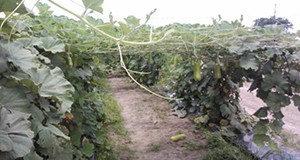Resumen
Long squash is an annual, vigorous, and herbaceous crop that was brought to the Americas by Paleoindian populations from Asia before the arrival of Columbus. This 4-page fact sheet provides an overview of this plant as well as recommendations for individuals in Florida who are interested in growing it. Written by Guodong Liu, Yuncong Li, David Dinkins, Bonnie Wells, Qingren Wang, and Yuqi Cui, and published by the UF Department of Horticultural Sciences, December 2015.
HS1272/HS1272: Long Squash—an Asian Vegetable Expanding in Florida (ufl.edu)
Citas
Erickson, D. L., B. D. Smith, A. C. Clarke, D. H. Sandweiss, and N. Tuross. 2005. "An Asian origin for a 10,000-year-old domesticated plant in the Americas." Proceedings of the National Academy of Sciences of the United States of America 102: 18315-18320. http://www.pnas.org/content/102/51/18315.full.pdf https://doi.org/10.1073/pnas.0509279102
Gibson, A. C. 2013. "Cucurbitaceae-Fruit for peons, pilgrims, and pharaohs." University of California at Los Angeles. http://www.botgard.ucla.edu/html/botanytextbooks/economicbotany/Cucurbita/
Gilman, E. F., and D. G. Watson. 2014. Amphitecna latifolia: Black Calabash. ENH238. Gainesville: University of Florida Institute of Food and Agricultural Sciences. https://edis.ifas.ufl.edu/st079
Kistler, L., Á. Montenegro, B. D. Smith, J. A. Gifford, R. E. Green, L. A. Newsom, and B. Shapiro. 2014. "Transoceanic drift and the domestication of African bottle gourds in the Americas." Proceedings of the National Academy of Sciences of the United States of America 111: 2937-2941. https://doi.org/10.1073/pnas.1318678111
Lim, L. K. 2012. Edible Medicinal and Non Medicinal Plants: Volume 3, Fruit. 2012 Edition. Springer Science+Business Media: New York City. https://doi.org/10.1007/978-94-007-4053-2
Price, S. 1982. "When is a calabash not a calabash?" New West Indian Guide 56: 69-82. https://doi.org/10.1163/13822373-90002110
Upaganlawar, A., and R. Balaraman. 2009. "Bottle gourd (Lagenaria siceraria) 'A vegetable food for human health'-A comprehensive review." Pharmacologyonline 1: 209-226. http://pharmacologyonline.silae.it/files/newsletter/2009/vol1/028.Aman.pdf
USDA. 2015. USDA National Nutrient Database for Standard Reference Release 28: Full Report (All Nutrients): 11218, Gourd, white-flowered (calabash), raw. Accessed on November 30, 2015. http://ndb.nal.usda.gov/ndb/foods/show/3006?fg=&manu=&lfacet=&format=Full&count=&max=35&offset=&sort=&qlookup=11219
Whitaker, T. W., and G. F. Carter. 1954. "Oceanic drift of gourds-Experimental observations." American Journal of Botany 41: 697-700 https://doi.org/10.1002/j.1537-2197.1954.tb14397.x

